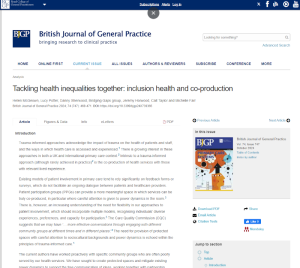Exploring co-production to tackle health inequalities through primary care services
27 September 2024
The ARC West Bridging Gaps project and Liverpool’s Tackling Racial Inequalities in Health project are case studies in a new British Journal of General Practice (BJGP) paper. The analysis explores how people with lived experience can be centred and empowered in co-designing trauma-informed primary care services that address health inequalities.
Bridging Gaps aims to improve access to GP practices for people who have experienced trauma and have complex needs. Bridging Gaps was started by academic GP Lucy Potter and a group of Bristol women who have experienced trauma, including addiction, homelessness, mental health problems, sexual exploitation, street sex work, domestic and sexual violence, and poverty.
Working alongside ARC West researcher Michelle Farr and professionals from One25, a charity that supports women who street sex work in Bristol, Bridging Gaps have been improving access to primary care.
The Central Liverpool Primary Care Network (CLPCN) Tackling Racial Inequality Working Group (TRIWG) was set up in response to the Black Lives Matter movement and the disproportionate impact of COVID-19 on global majority communities. The group is led by GPs, Dr Fiza Salam and Dr Cait Taylor. Social and economic inequalities, racism, discrimination, occupational risk and inequalities in the surveillance of long-term conditions all contribute to health inequalities. Lack of trust in NHS services and healthcare treatment is also an issue.
CLPCN commissioned Co-create to assist them in involving their patients in service development and identifying and addressing barriers to health equality.
The analysis, authored by people involved in both projects, shares reflections on how to work with communities to co-produce services designed for them:
- How and where to engage: creating safe spaces (such as Bridging Gaps’ all female group) and TRIWG’s approach of joining in with existing services and groups where people are already gathering
- Trust is vital: developing relationships takes long-term commitment on the part of services. People shouldn’t be expected to share their trauma and experiences.
- Work with existing groups outside of primary care: this can help address power imbalances
- Agree boundaries: mutually agreed roles and boundaries should be agreed early on. This should include careful consideration and clear communication around safeguarding and confidentiality
The authors conclude:
“The need for significant support, time, resource and expertise to enable safe participation for those who are least well served by existing models of care may in part explain why so many voices are currently excluded from development of primary care services. This is likely to perpetuate health inequalities.
“Our experiences highlight that co-production is possible, but collaboration is key. To move beyond the PPG, practices need to look to their wider communities and ‘join in’ with what is already going on.
“As demonstrated in Liverpool, outreach by local PCNs to community groups can greatly widen participation in service development. Partnering with charity One25 in Bristol gave Bridging Gaps access to those with experience and availability to provide regular support to members of our group.
“As we seek to move towards the delivery of trauma-informed care, there is a need for dedicated resource and funding so that patient voice is meaningfully and safely embedded at the heart of future system change.”
Paper
